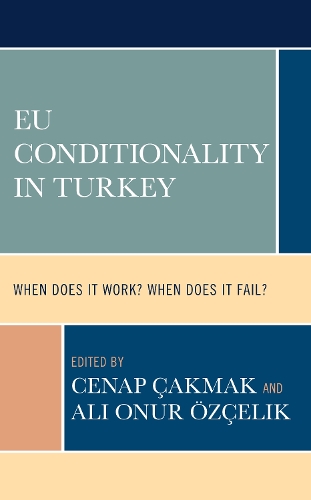
EU Conditionality in Turkey: When Does It Work When Does It Fail
(Hardback)
Publishing Details
EU Conditionality in Turkey: When Does It Work When Does It Fail
By (Author) Cenap akmak
Edited by Ali Onur zelik
Contributions by Neriman Hocaoglu Bahadir
Contributions by Sinem Bal
Contributions by Cenap akmak
Contributions by Anthony Costello
Contributions by Seven Erdogan
Contributions by Ali Onur zelik
Contributions by Devrim Sahin
Contributions by Ahmet Szen
Bloomsbury Publishing PLC
Lexington Books/Fortress Academic
1st August 2022
United States
Classifications
Professional and Scholarly
Non Fiction
Politics and government
327.40561
Physical Properties
Hardback
240
Width 160mm, Height 227mm, Spine 24mm
526g
Description
EU Conditionality in Turkey: When Does it Work When Does it Fail seeks to address several interconnected questions on the terms, circumstances, and factors that make the dynamics of conditionality work or fail in the case of the European Union-Turkey relationship. Analyzing the areas of disputes and of agreements, the contributions of this edited volume are focused on exploring the strengths and weaknesses of what the conditionality offers or stipulates, and what Turkey, as a candidate state, is capable or incapable of performing in response. Through a detailed analysis of each separate case underlined by the parties involved in the process of Turkeys accession to the EU, the editors and the contributors of this collection expertly infer how, when, and under what conditions the concept of conditionality works or fails.
Reviews
This volume offers a lucid and insightful analysis of Europeanization and de-Europeanization processes in Turkey in a myriad of policy fields ranging from rule of law, foreign policy, democratization, womens rights to civil society, environmental policy, migration and development aid. It problematizes most of the established discourses on Europeanization and goes beyond the straightjacket of conditionality by fully engaging in both internal and international factors shaping the impact of EU-led processes in Turkey. It also presents a well-balanced analysis of the current stalemate in Turkey-EU relations as well as potential areas of cooperation between the two. This book stands out in the crowded literature of Europeanization and Turkey-EU relations.
-- Alper Kaliber, Altinbas UniversityAn extremely insightful book aiming to understand the role and evolution of EU conditionality in the age of crises for the EU and Turkey. The book boldly touches upon all hot issues such as the rule of law, democratization, women's rights, migration, environment, and foreign policy in the contested period of de-Europeanization in Turkey-EU relations. It will undoubtedly be essential reading for those interested in Turkey-EU relations, EU enlargement, and Europeanization literature.
-- Erhan ener, stanbul Sabahattin Zaim UniversityThe contributions to this volume explore the limits and obstacles to EU membership conditionality in the case of Turkey through the phases of democratization, proto-Europeanization and de-Europeanization. They analyze different levels from domestic to global across a variety of policy areas to produce a multi-faceted and empirically rich picture of EU-Turkey relations, drawing on a range of theoretical approaches from explanation to critique. An important contribution to the debate about the EU's impact on its neighborhoodand its failures and unintended consequences.
-- Thomas Diez, University of TbingenAuthor Bio
Cenap Cakmak is professor of international law and politics at Anadolu Universitys Department of International Relations.
Ali Onur zelik is associate professor and a full-time lecturer in the International Relations Department at Eskisehir Osmangazi University.
